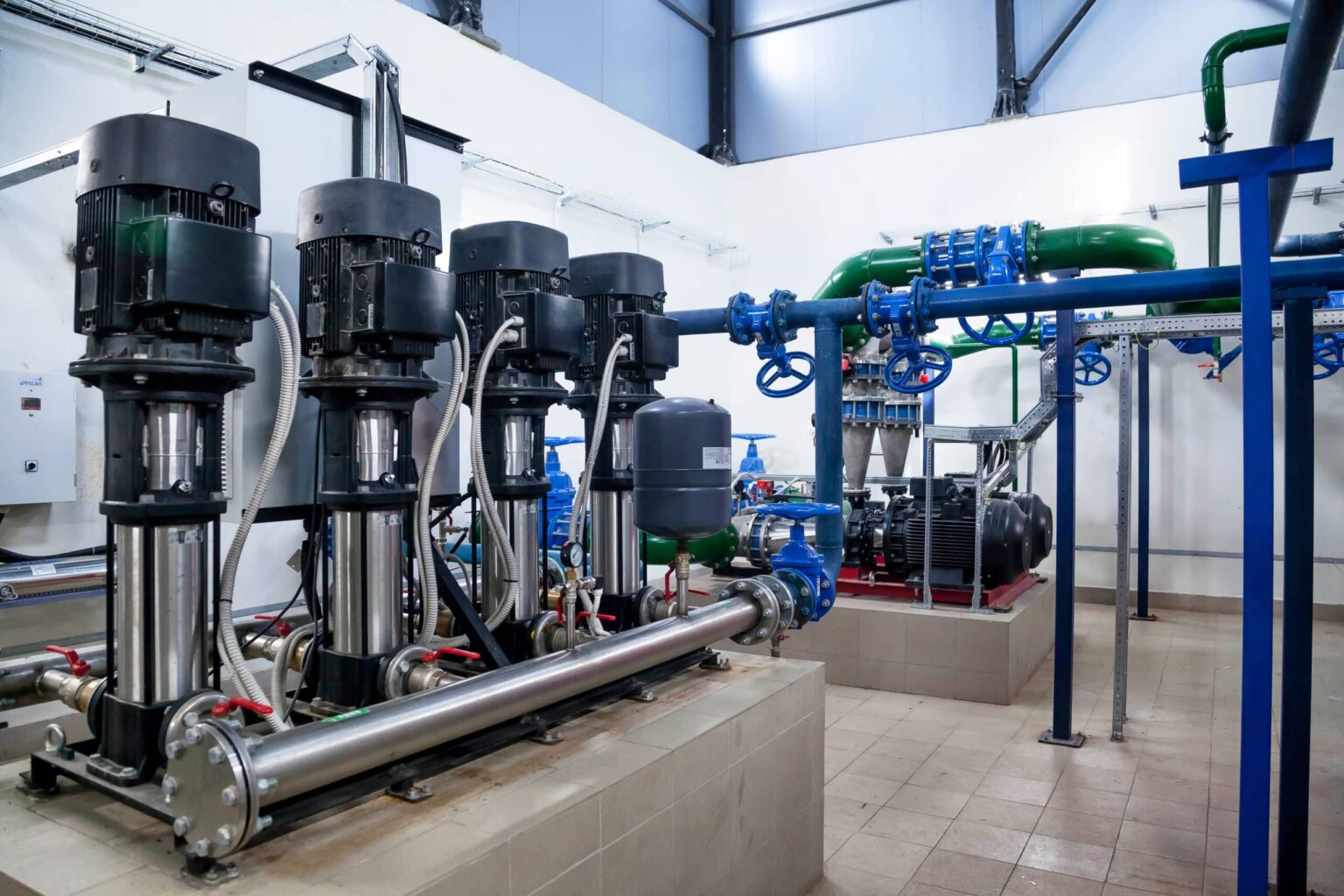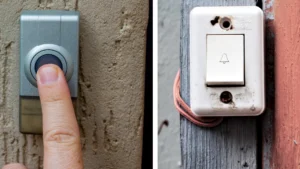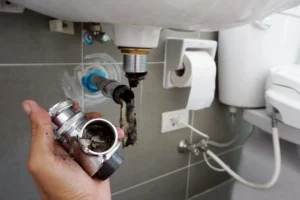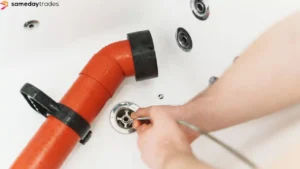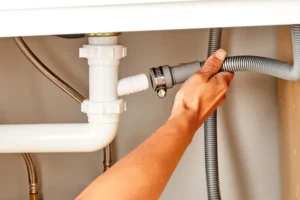Getting hot water when you need it can sometimes be a challenge. Hot water pumps are changing that fact. This article will show you how these systems work and why they’re good for your home.
Keep reading to learn more!
Understanding Hot Water Heat Pumps
Understanding hot water heat pumps requires a grasp of heat pump technology. These systems efficiently pull heat from their surroundings and use it to warm your water, making them a smart choice for modern homes.
The science behind heat pump technology
Hot water heat pumps use a refrigeration cycle to extract heat from the air. They absorb warm air and transfer it to an insulated tank that heats water. This process works similarly to a refrigerator but in reverse.
The pump pulls heat from the surrounding environment, making it energy efficient.
Heat pump hot water systems can provide both space heating and water heating for your home. They consume up to 70% less electricity than traditional electric water heaters. Geothermal heat pumps excel by producing more than four units of heat energy for every unit consumed.
Such efficiency makes them a smart choice for eco-friendly heating solutions in your home.
How refrigeration pulls heat
Refrigeration pulls heat from the surrounding environment. A heat pump water heater works similarly to a refrigerator but in reverse. It absorbs heat from the air around it and transfers that energy to the water inside its insulated tank.
This process relies on specific working fluids that circulate within the system, helping maintain efficiency.
This technology enables hot water heat pumps to use less electricity than traditional water heaters. They can reduce electricity consumption by up to 70%. With geothermal options available, these systems can produce more than four units of heat energy for every unit used.
Using a circulation pump, these systems move heated water efficiently throughout your home’s plumbing service, ensuring comfort while being eco-friendly and cost-effective.
Compressing for efficiency
Compressing air plays a crucial role in hot water heat pumps. This process boosts efficiency by increasing the temperature of the absorbed heat. These systems work similarly to refrigerators, transferring heat from outside to the water inside the heater.
By compressing this collected air, the heat pump system enhances its ability to warm water effectively.
Heat pumps use up to 70% less electricity than traditional electric water heaters. They operate by absorbing surrounding air and circulating it through parts designed for optimal performance.
The innovative design allows these units to produce more than four units of heat energy for every unit used, promoting energy efficiency and reducing costs for homeowners seeking eco-friendly heating solutions.
Heat release and recirculation
Hot water heat pumps effectively release heat through a process called recirculation. They absorb heat from the surrounding air and transfer it to the water inside an insulated tank.
This process allows these systems to maintain a steady supply of hot water for your home. The pump efficiently circulates warm air, ensuring consistent heating performance.
Geothermal heat pumps can outperform traditional systems by producing over four units of heat energy for every unit used, showcasing their efficiency. By transferring outside heat into the heater, they provide excellent water heating while using up to 70% less electricity than electric boilers or other conventional heaters.
Types of Hot Water Heat Pumps
Types of hot water heat pumps include air-source, ground-source, and hybrid systems. Each type serves unique heating needs. Air-source pumps pull warmth from the air outside. Ground-source pumps extract heat from the ground for greater efficiency.
Hybrid systems combine features for versatile performance. Explore these options further to find out which best suits your home’s requirements.
Air-source heat pumps
Air-source heat pumps extract heat from the surrounding air to heat water effectively. These systems work by absorbing air directly around them and circulating it through the pump.
They go through a refrigeration cycle, much like a refrigerator in reverse. As they transfer heat to the water inside the heater, they create an efficient water heating system.
These pumps are highly energy efficient and can use up to 70% less electricity than traditional electric water heaters. In many cases, they provide both space heating and hot water for your home, making them practical for multiple needs.
With government rebates available for heat pump hot water systems, homeowners find these units cost-effective as well.
Ground-source heat pumps
Ground-source heat pumps utilize the constant temperature of the ground to heat water. These systems draw heat from below the earth’s surface and transfer it to your home’s insulated tank.
They can provide more than 4 units of heating energy for each unit consumed, making them highly efficient. Ground-source pumps are eco-friendly and help reduce electricity usage significantly compared to traditional electric water heaters.
These pumps also serve as a space heating system in addition to warming your water. The technology behind these pumps is similar to that of a refrigerator but operates in reverse, transferring heat into the water instead of away from it.
Government rebates make ground-source heat pumps a cost-effective choice for many homeowners seeking renewable energy solutions. Now let’s explore hybrid systems next.
Hybrid systems
Hybrid systems combine different heating methods to provide efficient water heating. These systems use both heat pump technology and traditional electric resistance units. By doing this, they adapt to varying temperatures and demands for hot water.
During warmer months, the heat pump draws on surrounding air to extract heat efficiently. In colder months, when outdoor air holds less warmth, the system switches to its electric component.
Heat pump hot water systems in hybrid models can save up to 70% electricity compared to standard electric heaters. This significant reduction in energy consumption makes them an eco-friendly choice for homes seeking comfort while minimizing costs.
Homeowners can also benefit from available government rebates that make these hybrids a cost-effective option for heating water effectively and responsibly.
Benefits of Hot Water Heat Pumps
Hot water heat pumps provide significant energy savings for your home. They use less electricity while delivering reliable and consistent heating, making them a smart choice for eco-conscious homeowners.
Energy efficiency
Hot water heat pumps offer impressive energy efficiency. They use up to 70% less electricity than traditional electric water heaters. This significant reduction in energy usage makes them one of the most affordable options for heating water in your home.
A heat pump hot water system absorbs heat from the surrounding air and transfers it to the water inside the heater. This process mimics a refrigerator working in reverse, maximizing every unit of electricity used.
Geothermal heat pumps stand out even more by producing over four units of heat energy for each unit consumed. By selecting a hot water heat pump, you make an eco-friendly choice that benefits both your wallet and the planet.
Government rebates also reduce costs further, adding to their appeal as a sensible option for home comfort.
Lower energy usage
Lower energy usage follows closely from energy efficiency. Hot water heat pumps use up to 70% less electricity than traditional electric water heaters. This significant reduction means homeowners save money on their energy bills.
These systems efficiently absorb heat from the surrounding air and transfer it to the water inside the heater. They operate much like a refrigerator in reverse, making them a smart choice for eco-friendly heating solutions.
With lower operating costs, many find hot water heat pumps an affordable option for heating their homes while protecting the environment.
Eco-friendly heating
Hot water heat pumps provide an eco-friendly heating option for your home. They use up to 70% less electricity than traditional electric water heaters, making them highly energy efficient.
These systems absorb heat from the surrounding air and transfer it to the water inside the heater. This process greatly reduces energy usage while still delivering effective hot water heating.
Furthermore, geothermal heat pumps can produce more than four units of heat energy for every unit of electricity consumed. By utilizing renewable resources, hot water heat pumps offer an environmentally friendly way to meet your heating needs.
Next, let’s explore the ways you can maintain and maximize the performance of these systems.
Cost analysis
Heat pump hot water systems stand out as one of the most cost-effective ways to heat water in your home. They use up to 70% less electricity than traditional electric water heaters.
This significant energy efficiency translates into lower monthly utility bills for homeowners. Installing a geothermal heat pump can provide more than four units of heat energy for every unit consumed.
Government rebates are available, making these systems an even smarter financial choice. Investing in hot water heat pumps not only offers savings but also promotes eco-friendly heating options for your home.
Maintaining and Maximizing Performance
To keep your hot water pump running smoothly, choose the right model for your home and follow regular maintenance routines. Discover how these steps can extend the life of your system and improve heating efficiency.
Selecting the right heat pump
Selecting the right heat pump is crucial for your home. Choose a system that fits your heating needs and budget. Hot water heat pumps use a refrigeration cycle to extract heat from the air, making them highly efficient.
They consume up to 70% less electricity than traditional electric water heaters.
Consider air-source or ground-source options based on your location. Air-source heat pumps work well in moderate climates, while ground-source systems offer greater efficiency in extreme temperatures.
Government rebates can also make these pumps more affordable. Investing in a good hot water pump leads to eco-friendly heating and long-term savings on energy costs.
Maintenance tips
Choosing the right heat pump sets the stage for effective maintenance. Regular upkeep ensures your system runs smoothly and efficiently. Check filters frequently and clean them to maintain airflow.
Dust and debris can hinder performance, so keep the area around the heat pump clear.
Inspect insulation on pipes to prevent energy loss. Address any signs of wear promptly to avoid bigger issues later. Hot water heat pumps already consume up to 70% less electricity than traditional systems, but regular maintenance helps maximize this efficiency even further.
Keeping an eye on components will help you enjoy eco-friendly heating without interruptions.
Innovative features
Hot water heat pumps come with several innovative features that enhance their performance. These systems use a refrigeration cycle to extract heat from the surrounding air and transfer it directly into an insulated tank.
By absorbing this heat, they can efficiently warm water for your home. Some models also integrate smart technology, allowing homeowners to monitor energy usage through mobile apps.
These pumps typically operate much like a refrigerator in reverse, transferring heat from outside the unit to the water inside. This method makes hot water heat pumps up to 70% more electricity-efficient than traditional electric water heaters.
With these advancements, homeowners enjoy lower energy bills while benefiting from eco-friendly heating solutions. Government rebates further make these systems an affordable choice for many families seeking sustainable options.
Maximizing efficiency and performance
Selecting the right heat pump is crucial for maximizing efficiency and performance. These systems work by absorbing heat from the surrounding air and transferring it to water in an insulated tank.
A well-chosen hot water heat pump can use up to 70% less electricity than traditional electric water heaters. This significant energy savings makes them a smart choice for homeowners.
Regular maintenance also plays a vital role in keeping your system running effectively. Simple tasks like cleaning filters and checking seals will enhance performance. Many innovative features, such as smart thermostats, help optimize energy consumption further.
Ground-source heat pumps can deliver more than four units of heat energy for every unit used, making them incredibly efficient options that suit various homes.
Exploring the benefits of these systems reveals their potential impact on your home’s heating needs.
Conclusion
Hot water heat pumps play a crucial role in modern homes. They efficiently extract heat from the air and transfer it to water. This technology saves energy and reduces electricity costs.
With various types available, homeowners can find the right fit for their needs. Embracing hot water heat pumps means choosing an eco-friendly heating solution that benefits both your budget and the environment.

